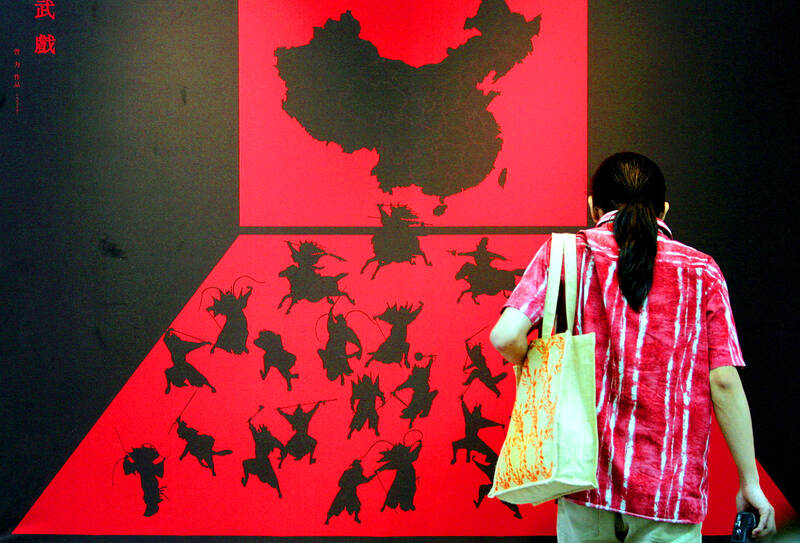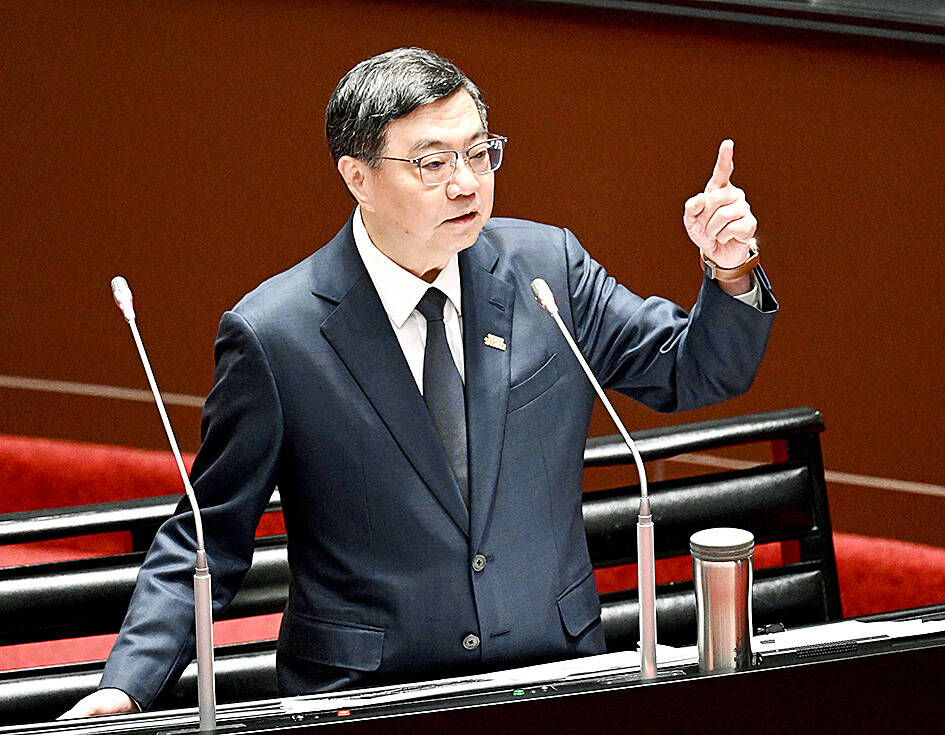“Reunification” with China is “not an option” for Taiwan, Premier Cho Jung-tai (卓榮泰) said yesterday, after Chinese state media reported that the issue was brought up in a telephone call between Chinese President Xi Jinping (習近平) and US President Donald Trump.
“We have noted this significant international exchange, but we must reiterate that the Republic of China (Taiwan) is a fully sovereign and independent country,” Cho said at the legislature when reporters asked him about the issue.
“The 23 million people of Taiwan do not have a ‘reunification’ option. This is very clear. Taiwan is the world’s Taiwan,” Cho said.

Photo: Richard Chung, Reuters
Trump and Xi spoke over the telephone on Monday to discuss various issues.
In a social media post, Trump made no mention of Taiwan, saying instead that he and Xi discussed Ukraine, fentanyl, a deal on agricultural products, and forthcoming bilateral visits by himself and Xi.
However, Xinhua reported that Xi told Trump that “Taiwan’s reunification with China” is an important component to the post-World War II international order, and Trump replied that the US acknowledged Taiwan’s importance to China.

Photo: Peter Lo, Taipei Times
Cho said Taiwan is critically important to the international community in terms of regional security, and technological and economic development, and that maintaining the “status quo” is therefore something on which the world is collectively focused.
“China cannot undermine this ‘status quo’ in any way,” he said, adding that this is why Taiwan has been strengthening its defense capabilities and standing with like-minded democratic nations.
Separately, Deputy Minister of Foreign Affairs Francois Wu (吳志中) said that Trump’s silence on the issue signaled that Taiwan was not being treated as a bargaining chip in broader US-China talks.
“It is the best result, that we are not mentioned, meaning we are not part of the deal,” he said by telephone.
“We understand that Taiwan is China’s core interest, but it is also a core interest for Japan, the US and Europe,” Wu said, adding that Taipei maintains “frequent and intensive communication with the US.”
The Ministry of Foreign Affairs said that China is deliberately misinterpreting World War II documents in an attempt to coerce Taiwan.
Taiwan is a sovereign and independent state that is not subordinate to the People’s Republic of China, the ministry said.
Communication channels between the US and Taiwan remain smooth, although relevant details would not be made public, ministry spokesman Hsiao Kuang-wei (蕭光偉) told a news conference in Taipei.
The American Institute in Taiwan has publicly reaffirmed the US’ position on Taiwan and said that Beijing is willfully misinterpreting wartime documents, he said.
Beijing’s narrative is entirely false, and aims to isolate Taiwan internationally and limit other nations’ sovereign choice to interact with Taiwan, he added.
China is driven by authoritarian expansionism and has repeatedly sought to intimidate Taiwan, Japan and other neighboring nations in violation of the UN Charter’s prohibition of threats or use of force in international relations, the ministry said.
None of the World War II documents — including the Cairo Declaration, the Potsdam Declaration and the San Francisco Peace Treaty — nor subsequent UN resolutions determine Taiwan’s political status, Presidential Office spokeswoman Karen Kuo (郭雅慧) said.
As a responsible member of the international community, Taiwan would continue working with like-minded partners to maintain the cross-strait “status quo,” and safeguard regional peace, stability and prosperity, she said.
Additional reporting by Hollie Younger

The Central Election Commission has amended election and recall regulations to require elected office candidates to provide proof that they have no Chinese citizenship, a Cabinet report said. The commission on Oct. 29 last year revised the Measures for the Permission of Family-based Residence, Long-term Residence and Settlement of People from the Mainland Area in the Taiwan Area (大陸地區人民在台灣地區依親居留長期居留或定居許可辦法), the Executive Yuan said in a report it submitted to the legislature for review. The revision requires Chinese citizens applying for permanent residency to submit notarial documents showing that they have lost their Chinese household record and have renounced — or have never

A magnitude 5.6 earthquake struck off the coast of Yilan County at 12:37pm today, with clear shaking felt across much of northern Taiwan. There were no immediate reports of damage. The epicenter of the quake was 16.9km east-southeast of Yilan County Hall offshore at a depth of 66.8km, Central Weather Administration (CWA) data showed. The maximum intensity registered at a 4 in Yilan County’s Nanao Township (南澳) on Taiwan’s seven-tier scale. Other parts of Yilan, as well as certain areas of Hualien County, Taipei, New Taipei City, Taoyuan, Hsinchu County, Taichung and Miaoli County, recorded intensities of 3. Residents of Yilan County and Taipei received

Taiwan has secured another breakthrough in fruit exports, with jujubes, dragon fruit and lychees approved for shipment to the EU, the Ministry of Agriculture said yesterday. The Animal and Plant Health Inspection Agency on Thursday received formal notification of the approval from the EU, the ministry said, adding that the decision was expected to expand Taiwanese fruit producers’ access to high-end European markets. Taiwan exported 126 tonnes of lychees last year, valued at US$1.48 million, with Japan accounting for 102 tonnes. Other export destinations included New Zealand, Hong Kong, the US and Australia, ministry data showed. Jujube exports totaled 103 tonnes, valued at

BIG SPENDERS: Foreign investors bought the most Taiwan equities since 2005, signaling confidence that an AI boom would continue to benefit chipmakers Taiwan Semiconductor Manufacturing Co’s (TSMC, 台積電) market capitalization swelled to US$2 trillion for the first time following a 4.25 percent rally in its American depositary receipts (ADR) overnight, putting the world’s biggest contract chipmaker sixth on the list of the world’s biggest companies by market capitalization, just behind Amazon.com Inc. The site CompaniesMarketcap.com ranked TSMC ahead of Saudi Aramco and Meta Platforms Inc. The Taiwanese company’s ADRs on Tuesday surged to US$385.75 on the New York Stock Exchange, as strong demand for artificial intelligence (AI) applications led to chip supply constraints and boost revenue growth to record-breaking levels. Each TSMC ADR represents